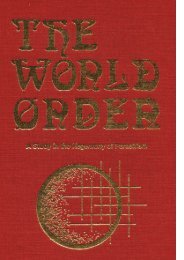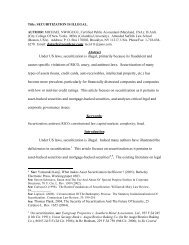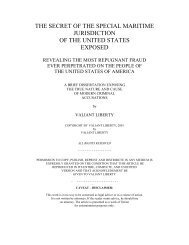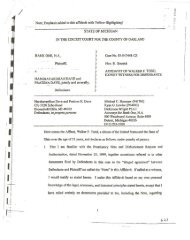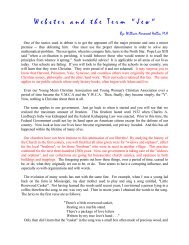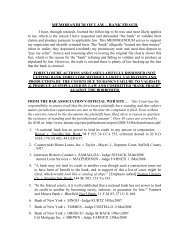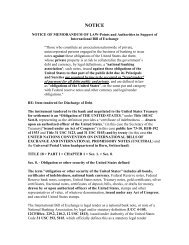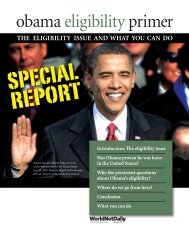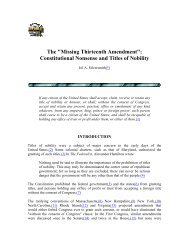Piercing the Corporate Veil - USA The Republic
Piercing the Corporate Veil - USA The Republic
Piercing the Corporate Veil - USA The Republic
You also want an ePaper? Increase the reach of your titles
YUMPU automatically turns print PDFs into web optimized ePapers that Google loves.
esponsible to <strong>the</strong> depositor and an affidavit to that bank should result in <strong>the</strong><br />
immediate redeposit of those funds.<br />
Your deposit in a bank is a "bailment" and while no fiduciary relationship is<br />
created by this bailment (because it is of <strong>the</strong> bank in general and not an individual)<br />
your signature card reflects <strong>the</strong> only authority for <strong>the</strong> disposition of your "money."<br />
As was shown recently, an affidavit, notifying <strong>the</strong> bank that <strong>the</strong> depositor was not a<br />
part of <strong>the</strong>ir or any o<strong>the</strong>r corporation, and that <strong>the</strong> one signing a check to <strong>the</strong> State<br />
Tax Division was responsible for <strong>the</strong> depositor's money and not <strong>the</strong> depositors<br />
<strong>the</strong>mselves, since <strong>the</strong>ir signatures appeared on no part of <strong>the</strong> transaction, and <strong>the</strong><br />
bank had to recall <strong>the</strong> checks, <strong>the</strong> tax "debt" was cleared, and all money was redeposited<br />
into <strong>the</strong> accounts of <strong>the</strong> husband and wife, who had separate banks and<br />
accounts. Powerful stuff, <strong>the</strong>se affidavits, and those writing <strong>the</strong> laws back in 1925<br />
knew what <strong>the</strong>y were doing.<br />
One man was hesitant to use this system because "judges just walk all over those who<br />
challenge <strong>the</strong>ir jurisdiction." Well, with <strong>the</strong> affidavit we most certainly are<br />
challenging <strong>the</strong>ir jurisdiction, but not in general. Any rebuttal at all is a challenging<br />
<strong>the</strong>ir jurisdiction, and that is what it is all about. What we need to get straight right<br />
off is <strong>the</strong> fact that <strong>the</strong>y DO have jurisdiction in <strong>the</strong>ir corporate capacities, but that<br />
doesn't mean <strong>the</strong>y can bring non-corporate citizens into that jurisdiction (which is<br />
exactly what <strong>the</strong>y have done through fraud).<br />
All we are doing with <strong>the</strong> affidavit is merely showing <strong>the</strong>m that <strong>the</strong>ir assumptions<br />
that all men are a part of <strong>the</strong>ir scheme are very wrong, and that we have <strong>the</strong> law on<br />
our side that shows <strong>the</strong>m to be wrong.<br />
Corporations, even though <strong>the</strong>y are "legal" fictions, are still businesses; businesses<br />
are commercial enterprises, and commercial enterprises are controlled by <strong>the</strong><br />
Uniform Commercial Code (UCC).<br />
Judges will tell you differently and <strong>the</strong>y will be wrong. Corporations are established<br />
by <strong>the</strong> State, whe<strong>the</strong>r Federal or o<strong>the</strong>rwise, (government is State) and all States of<br />
<strong>the</strong> Union have accepted <strong>the</strong> UCC (which originally was established for <strong>the</strong> District<br />
of Columbia, if my information is correct). <strong>The</strong> UCC is a complicated mass of<br />
business jargon to <strong>the</strong> casual reader, but in reality our rights are contained in <strong>the</strong><br />
pages of those documents. Our right to contract, fair play in contracts, business,<br />
and all o<strong>the</strong>r aspects of human commerce activities are covered in <strong>the</strong> UCC.<br />
While man, especially <strong>the</strong> Christian man, is born with <strong>the</strong> common law in his heart,<br />
<strong>the</strong> English common law was derived from commerce and commercial law itself. In<br />
<strong>the</strong> middle ages, open "fairs," or trading centers were set up in England (and most<br />
likely in all o<strong>the</strong>r countries of Europe) where people could bring <strong>the</strong>ir produce and<br />
goods to sell.



